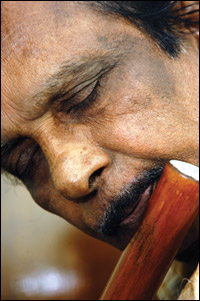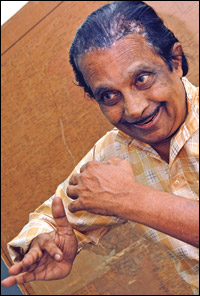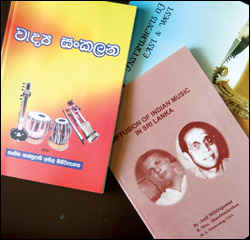Transcending meditative notes
Jayanthi LIYANAGE
Renowned flutist and musician Anil Mihiripenna was the first Sri
Lankan to obtain degrees in both flute and esraj. Running his Sharadha
Kala Niketanaya, he has
|

Anil Mihiripenna with his flute |
|

Anil Mihiripenna. Pictures by Ruwan de Silva |
endeavoured to teach, develop and popularise Indian classical music
in Sri Lanka for the last forty years.
Mihiripenna graduated from Vishva Bharati University in India (Shanthinikethana)
and studied esraj from maestro Ashish Chandra Benerji, flute from Pandit
Gowr Goswamy and vocals from Pandit Jamini Kantha Chakrawarthi.
Widely travelled on concert tours to the USA, Hong Kong, Taiwan,
Singapore and India, he has been conferred Master of Arts (Musicology)
by the Open International University of the USA.
With his next concert just days away, Mihiripenna converses with the
Daily News about a couple of issues that he feels passionately about.
What do you think of the position of
instrumental music in Sri Lanka?
Indian instrumentalists have better teachers and a better future,
when you compare them with our instrumentalists. The main difference in
India is that they learn under the guru kula system. Knowledge passes
from teacher to son. Even in Sri Lanka, we had this system under Kandyan
dancing.
Students had to stay in the premises. I am trying my best to have
this system here. I have asked the Government to give us a land to
enable us to do this. The famous Ravi Shankar stayed with Master
Alaudeen Khan in his ashram and practiced 12 hours a day. If people in
Sri Lanka get the same opportunity, we can produce better
instrumentalists. We need the environment to produce better musicians.
In other countries instrumental music
is used more widely than vocal music. Why is it not happening in Sri
Lanka?
It is a pity. The Government invites singers and beautiful actresses
for meetings with artistes (kalakaruwo) but instrumentalists are not
invited. Only I was there
|

Anil Mihiripenna’s CD |
|

Books authored by Anil Mihiripenna |
once. I did not see any other instrumentalists. This happens only in
Sri Lanka. In India, intrumentalists are too invited to gatherings. To
do a song, you need a lyricist, a musician to compose music and an
orchestra and then only the singer comes. In Sri Lanka, only the singer
is seen and not the other people who contributed to the song. It is a
pathetic situation. Someday, it should change.
How do you use music against stress?
Four years back, I went to a college of music in Calcutta for a
performance on flute. I use my flute for meditation and relaxation and
usually close my eyes when I play.
When I opened my eyes after about ten minutes, to my surprise, many
of the professors, pandits and various other people in the audience were
sitting on the floor. I did not get my clap and the organizers said that
for bhavana, they do not clap. Then I realised my capability to
mesmerise people with my flute, my bansuri (Hindi word for flute).
What do you see as your musical
achievements?
My esraj teacher was eminent Ashish Chandra Benerji. He did not allow
us to write notations. Books were not allowed in the class. He said,
‘You can write not on books but in your head.’ For three years, I did
not write anything. That was a good way of teaching. What I learnt then,
I still can remember.
In Sri Lanka, light music is more
popular. How can you make classical music popular?
You know what people call a ‘rella’ (wave). A wave is very nice but
it goes back. This happens to musicians who are in a wave. People who
have studied in India like Pandit Amaradeva, my friend Sanath Nandasiri
and Victor Ratnayake have not gone back. But ‘wave’ people fall with a
thud. If your house does not have a foundation, it will collapse. If you
learn music, you will remain a musician for a very long time.
What are your travel experiences?
My first tour was to Nebraska State in the USA. We did some workshops
and public performances there. We had to teach our music to Amercian
boys and girls in the Wesleyan University.
I taught music and my brother Basil Mihiripanne taught dancing. I was
given the post of Visiting Professor of Ethno Music (music of Sri Lanka,
India, the Middle East and Nepal). My children were small then and I did
not want to bring them up there and I did not accept. The Governor of
Nebraska confered on me honorary citizenship.
******
Anil Mihirippenna live
“Anil Mihirippenna and Orchestra in Concert” takes stage at
Elphinston Theatre, Maradana, at 6 pm on March 25. The Chief Guest of
the occasion will the High Commissioner for Bangladesh in Sri Lanka. The
concert is open to invitees and those of the public with an ear attuned
for classical music.
The evening’s program will be a rare treat, promises Mihiripenna. A
Kathak dance item infused with orchestral music revolves round a story
with a happy ending. A bamboo flute playing session will be based on the
“Jog” raga. Mihiripenna’s prowess to hypnotise audiences with flute
playing will once again be demonstrated in Sangeet Bhavana. There will
be “tumri” (lighter vein classical music) and “bhatiyali” (boatman
songs), a type of music prevalent in East Bengal and Bangladesh. There
will also be improvisations of old Sri Lankan folk songs and ghazals
sung by Mihiripenna’s grandson Tharindu Damith.
******
Books - Anil Mihiripenna Authored
* New compositions for North Indian Music
* Diffusion of Indian Music in Sri Lanka
* Instruments of the East and the West
* Vadya Sankalana (Sinhala)
CDs
*Sangeeth Bhavana
*Saratha Sankalana |



